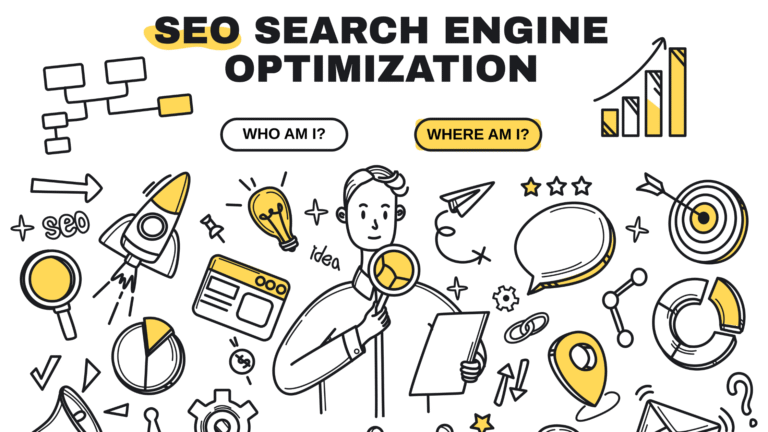Search engine optimization is evolving faster than ever. Google is smarter, competition is tougher, and user expectations are higher. If you’re still relying on old SEO tactics, you’re going to be left behind.
To succeed online in 2026, you must stay ahead of the curve.
In this article, we explore the top 10 SEO trends that will shape digital marketing this year and how you can take advantage of them.
1. AI-Powered Search Is Taking Over
Artificial Intelligence (AI) has become an integral part of how search engines operate. Google’s BERT and MUM algorithms utilize deep learning to comprehend search intent in a manner that extends far beyond simple keywords.
In 2026, AI will be analyzing tone, emotion, and the relationship between topics to provide more accurate and relevant results.
For example, when a user types “best laptop for remote work,” Google no longer just looks for keyword matches. Instead, it understands the intent: someone looking for recommendations, specs, prices, and maybe even comparisons.
Actionable Tips:
-
Use conversational language in your content.
-
Focus on user intent, not just search terms.
-
Optimize for long-tail queries and semantic phrases.
2. Voice Search Optimization is Now Essential
Voice search has exploded with the use of smart devices like Google Home, Alexa, and Siri. Over 60% of global searches are now voice-based. Unlike typed searches, voice queries are more natural and question-based, like “What’s the best time to post on Instagram?”
In 2025, optimizing your site for voice search is a must if you want to capture traffic from mobile and smart devices.
How to Optimize:
-
Target question-based keywords (“how”, “what”, “when”, “best way to”).
-
Add FAQ sections to answer common queries directly.
-
Ensure your website loads fast and is mobile-friendly.
3. First-Hand Experience & E-E-A-T Matter More Than Ever
Google has added a new “E” to its famous E-A-T guidelines: Experience. So now it’s E-E-A-T: Experience, Expertise, Authoritativeness, Trustworthiness.
In 2026, content written by people with first-hand experience in the subject matter will rank higher. Search engines are rewarding authenticity and genuine expertise.
For example, a blog about “how to start a coffee shop” will perform better if written by someone who has done it, rather than a generic content writer.
How to Build E-E-A-T:
-
Include author bios with credentials.
-
Share case studies, real-life examples, or testimonials.
-
Link to credible sources and get backlinks from authority websites.
4. Zero-Click Searches Continue to Rise
Zero-click searches happen when Google provides the answer directly in the search result, so users don’t need to visit your site. Featured snippets, People Also Ask boxes, and Knowledge Panels are examples.
In 2025, over half of Google searches will end without a click. That’s both a challenge and an opportunity.
How to Win:
-
Optimize content for snippets (answer questions in 1–2 sentences).
-
Use lists, tables, and bullet points.
-
Apply schema markup to highlight key data for Google.
5. Video Content Will Dominate SERPs
Video has become a major player in SEO. Google is showing YouTube videos and video carousels in top search results, especially for “how-to”, product demos, and tutorials.
In 2026, if your brand isn’t using video content, you’re missing out on both traffic and engagement.
Video SEO Tips:
-
Embed relevant videos in your blog posts.
-
Add transcripts and captions for better indexing.
-
Optimize your video titles, thumbnails, and metadata with target keywords.
6. Semantic Search and Contextual Relevance Take Over
Google is increasingly relying on semantic search, which means understanding the meaning behind words, not just the words themselves.
Search engines are now analyzing content relationships, topic clusters, and user search patterns to serve better results.
So instead of just targeting “digital marketing,” a well-performing post will cover related terms like “content strategy,” “social media ads,” and “email funnels.”
Best Practices:
-
Use semantic keywords (LSI keywords).
-
Build pillar pages with internal linking to related subtopics.
-
Structure content with clear headings and logical flow.
7. Core Web Vitals & Mobile-First Are Critical for Rankings
Google’s Core Web Vitals update focuses on three major things: loading speed, interactivity, and visual stability. In 2025, websites that don’t offer a smooth, fast mobile experience will fall in rankings.
Mobile-first indexing means Google ranks your site based on its mobile version, not desktop.
Optimize for Core Web Vitals:
-
Use responsive design for all devices.
-
Minimize image sizes and use lazy loading.
-
Improve LCP, FID, and CLS scores with tools like PageSpeed Insights or GTmetrix.
8. Local SEO Becomes Hyper-Relevant
With smarter geo-targeting and personalized results, local SEO is booming in 2026. Whether you’re a restaurant, plumber, or freelancer, appearing in local search results can bring high-intent traffic.
Google prioritizes results based on location, relevance, and reviews, especially on mobile.
Tips for Local SEO:
-
Create or update your Google Business Profile.
-
Use location-based keywords (“near me”, “in [city]”).
-
Get more positive reviews and respond to them regularly.
9. Content Updating & Repurposing Becomes a Priority
Google prefers fresh and relevant content. Pages that are old, outdated, or no longer useful lose rankings quickly. In 2025, refreshing your existing content is just as important as creating new posts.
Also, repurposing content across formats (e.g., turning a blog into a video or infographic) can extend its life and reach.
How to Stay Fresh:
-
Revisit top posts every 6–12 months.
-
Update with new data, trends, or tools.
-
Use content repurposing tools to expand reach (e.g., Lumen5 for video, Canva for infographics).
10. UX and SEO Are Fully Integrated
In 2026, SEO and UX (User Experience) are no longer separate efforts. Google now evaluates how users interact with your site—click-through rates, time spent, bounce rates, etc.—as part of its ranking algorithm.
A fast, intuitive, and engaging website can now directly boost your SEO.
Tips to Improve UX & SEO Together:
-
Use clear navigation and CTAs.
-
Improve readability with short paragraphs and visual aids.
-
Eliminate annoying pop-ups, broken links, and slow-loading elements.
Final Thoughts: Future-Proofing Your SEO Strategy
SEO in 2026 is about more than keywords—it’s about intent, user experience, authenticity, and adaptability. If you want to thrive in search, you need to:
-
Stay current with algorithm updates.
-
Deliver real value to real people.
-
Make your website technically sound and content-rich.
By implementing these 10 SEO trends you can’t ignore in 2026, you’ll position your website for long-term visibility and growth in an increasingly competitive digital world.



